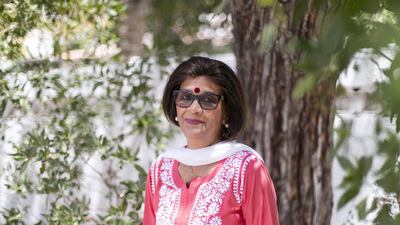Every Friday morning, Prameela Nadkarni packs lunch boxes with home-cooked meals and heads over to the hospital.
Some days she makes poori and bhaaji – fried bread with spicy potatoes. At other times she makes perfumed biryani, stuffed with spiced meats, to feed dozens of patients at Dubai's Rashid Hospital who have no family in the country.
For 17 years, Ms Nadkarni has been visiting hospitals and prisons, providing comfort, counsel and company for people who have no one else.
The Indian, 58, moved to Dubai in 1989 with her husband, and decided to delve into social work.
“In 2003, one of my customers mentioned there were patients in Rashid Hospital who need help. I started going to visit patients and I thought I was making a difference,” Ms Nadkarni says.
Ms Nadkarni joined a volunteer organisation, Valley of Love, and with her friend Elizabeth Kuruvilla, began visiting the hospital every week.
“The patients missed home-cooked meals and talking to their families. They would look forward to us coming over on Fridays with food.
“They would see everyone around them being cared for by loved ones. By just being there, we were helping them.
“When you are in the hospital, you need someone. We could see the relief in their eyes when we talked to them.”
Their conversations would revolve around their families, and though language was a barrier at times, they managed to communicate.
Sometimes Ms Nadkarni would help them call their family back home.
“They would give us a list of requests, usually simple fare like lentils, rice, vegetables and every Friday I would start cooking at 6.30am,” she says.
In 2007, when a patient they visited was transferred to Dubai’s central prison, Ms Nadkarni and her friend started visiting them there.
“When we went to the prison, people would tell us of their regrets. We used our money to send them funds so that they could buy food,” she says.
Now, Ms Nadkarni is unable to go the hospital but visits the prison every Tuesday.
“It is rewarding to see how people’s perspectives change and they become more forgiving,” she says.
She faced resistance at home as her family worried for her safety but she could not be deterred.
“I would have people calling me from the prison but was never afraid. I knew people who had been convicted of crimes. But, it was not my place to judge them,” she says.
“I felt that I had been blessed with a good life and that I should give back to society rather than limit myself to work and home.
“I had a wonderful childhood, a great family and two lovely daughters. I had time on my hands and wanted to give back to the community.”
She has helped pay for plane tickets to repatriate many people.
“Some of the people we helped repatriate keep in touch and are friends with us on Facebook now,” she says.
“My family was shocked at my dedication of waking up early and going to the hospital. They knew I loved my sleep, so they could not believe that I would wake up at 6.30am to cook.”
She plans to retire in India and wants to join a charity and keep up her work.
Ms Nadkarni's daughter, Vimla, 27, says her mother has been helping others for as long as she can remember.
“From a young age I have seen my mother visit old and sick people in Rashid Hospital. I remember accompanying her on these visits as a child and just making patients smile or listening to their stories. All they needed was some comfort and company and my mum provided that."
The pair would wear protective gear to visit a Russian woman kept in isolation while she was unwell.
“She was an artist and drew me a few sketches. When she was discharged and went back to Russia, we threw her a little farewell party in the garden of Rashid Hospital,” Vimla says.
“I remember many patients beaming when we walked in to the wards and that happiness left me feeling content, knowing that my mother and I were able to make so many people smile even in a hospital ward.”


